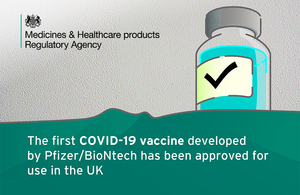The first COVID-19 vaccine for the UK, developed by Pfizer/BioNTech, has today been given approval for use following a thorough review carried out by the Medicines and Healthcare products Regulatory Agency (MHRA).
The decision by the UK regulatory authority was made with advice from the Commission on Human Medicines (CHM), the government’s independent expert scientific advisory body. A dedicated team of MHRA scientists and clinicians carried out a rigorous, scientific and detailed review of all the available data, starting in October 2020.
This was done using a regulatory process known as a ‘rolling review’. A ‘rolling review’ can be used to complete the assessment of a promising medicine or vaccine during a public health emergency in the shortest time possible. This is done as the packages of data become available from ongoing studies on a staggered basis.
The MHRA expert scientists and clinicians reviewed data from the laboratory pre-clinical studies, clinical trials, manufacturing and quality controls, product sampling and testing of the final vaccine and also considered the conditions for its safe supply and distribution.
The National Institute for Biological Standards and Control, part of the agency, has been and will continue doing, independent laboratory testing so that every batch of the vaccine meets the expected standards of safety and quality.
MHRA Chief Executive, Dr June Raine said:
We have carried out a rigorous scientific assessment of all the available evidence of quality, safety and effectiveness. The public’s safety has always been at the forefront of our minds – safety is our watchword.
I’m really pleased to say that the UK is now one step closer to providing a safe and effective vaccine to help in the fight against COVID-19 – a virus that has affected each and every one of us in some way - and in helping to save lives.
We are globally recognised for requiring high standards of safety, quality and effectiveness for any vaccine. Our expert scientists and clinicians worked tirelessly, around the clock, carefully, scientifically, robustly and rigorously poring over hundreds of pages and tables of data, methodically reviewing the data.
Vaccines are the most effective way to prevent infectious diseases. They save millions of lives worldwide.
|
|
||||||
Check Todays Deals on Ebay.co.uk Your Comments:
Custom Search

|
You are in:
UK /
Feltham / London
Find any Town in the UK, or Use UK map Local Google MAP for Feltham Check Todays Deals On Amazon.co.uk Check Todays Deals on Ebay.co.uk 


 Be Seen - Advertise on Qlocal Corporate Sponsors
Southport Piano and Music Academy Washroom Services Maximum Grounds Maintenance Southport Garden Services Ormskirk Garden Services Sanitary Bins Nappy Bins & Waste Disposal Confidential Shredding Services Legionella Risk Testing London Washroom Services Croydon Washroom Services Hounslow Washroom Services Wandsworth Washroom Services Havering Washroom Services Sanitary Bins London Clinical Waste London General Waste London Legionella Testing London Shredding London Tatoo Waste London Preston Bird Control Blackpool Bird Control
UK, Local Online News Community, Forums, Chats, For Sale, Classified, Offers, Vouchers, Events, Motors Sale, Property For Sale Rent, Jobs, Hotels, Taxi, Restaurants, Pubs, Clubs, Pictures, Sports, Charities, Lost Found
feltham,
feltham News,
|
|||||





 Reply With Quote
Reply With Quote